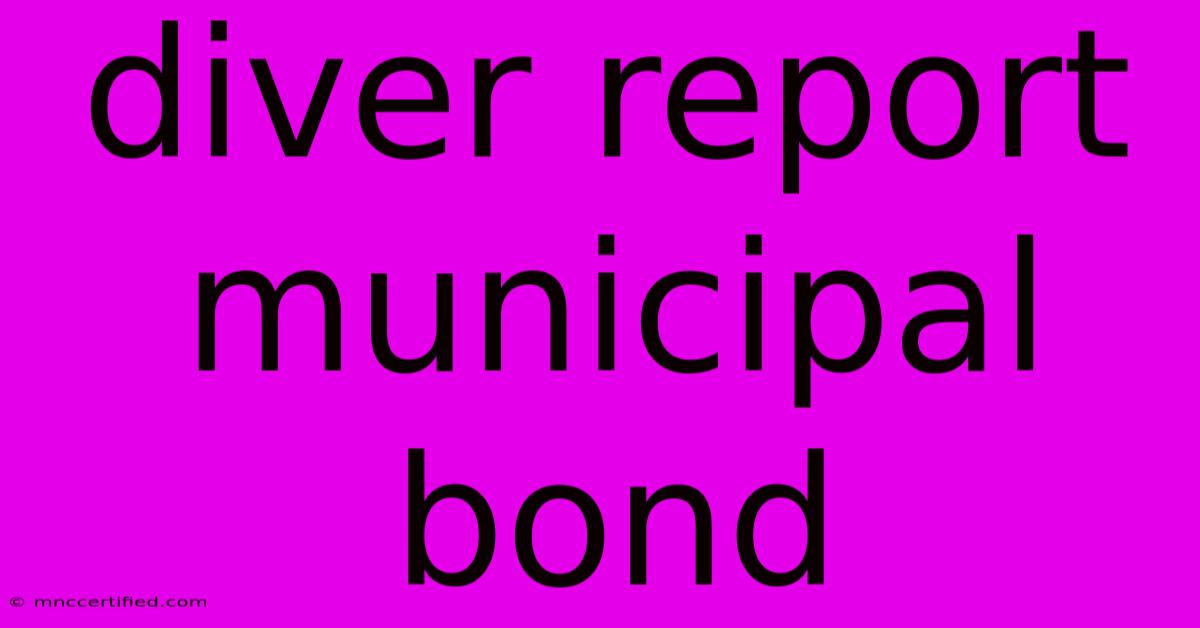Diver Report Municipal Bond

Table of Contents
Diver Report: Municipal Bond Deep Dive for Informed Investing
Municipal bonds, often overlooked in favor of their corporate counterparts, offer a unique blend of potential benefits and risks. Understanding these nuances is crucial for making informed investment decisions. This comprehensive diver report delves into the world of municipal bonds, exploring their characteristics, advantages, disadvantages, and considerations for inclusion in a diversified portfolio.
What are Municipal Bonds?
Municipal bonds are debt securities issued by state and local governments to finance public projects such as schools, hospitals, roads, and bridges. These bonds are considered relatively safe investments, often offering tax advantages that make them attractive to income-seeking investors. Key characteristics include:
- Tax-exempt interest: Interest earned on most municipal bonds is exempt from federal income tax. Depending on where you live, it may also be exempt from state and local taxes. This significant tax advantage boosts their after-tax yield, making them particularly appealing to high-income individuals and those in high tax brackets.
- Varying credit quality: Municipal bonds, like all bonds, come with different credit ratings reflecting the issuer's ability to repay the debt. Higher-rated bonds generally offer lower yields but less risk of default, while lower-rated bonds offer higher yields but come with greater risk.
- Maturity dates: Municipal bonds have varying maturity dates, ranging from short-term to long-term. Choosing the right maturity depends on your investment timeline and risk tolerance. Long-term bonds generally offer higher yields but are more susceptible to interest rate fluctuations.
- Types of municipal bonds: There are various types of municipal bonds, including general obligation bonds (backed by the issuer's taxing power) and revenue bonds (backed by the revenue generated by the financed project). Understanding these distinctions is crucial for assessing risk.
Advantages of Municipal Bonds
- Tax advantages: The primary advantage is the tax-exempt interest, significantly boosting the after-tax return, especially for investors in higher tax brackets.
- Diversification: Adding municipal bonds to a portfolio can diversify holdings, reducing overall portfolio risk as they tend to have a low correlation with stocks and corporate bonds.
- Relative safety: High-quality municipal bonds issued by financially stable municipalities are generally considered relatively safe investments with a lower risk of default compared to corporate bonds.
- Potential for steady income: Municipal bonds provide a steady stream of income through interest payments, making them suitable for income-oriented investors.
Disadvantages of Municipal Bonds
- Lower yields compared to taxable bonds: While the after-tax yield can be higher, the pre-tax yield on municipal bonds is often lower than that of taxable bonds.
- Interest rate risk: Bond prices are inversely related to interest rates. Rising interest rates can decrease the value of municipal bonds, especially long-term bonds.
- Credit risk: Lower-rated municipal bonds carry a higher risk of default, meaning the issuer might not be able to repay the debt. Thorough due diligence is crucial.
- Liquidity risk: Some municipal bonds can be less liquid than other investments, making it difficult to sell them quickly without incurring a loss.
- Complexity: Navigating the world of municipal bonds requires understanding various types, ratings, and tax implications. Professional advice is often recommended.
Diversification Strategies with Municipal Bonds
Municipal bonds should be considered part of a well-diversified investment portfolio, not a standalone strategy. Consider these points:
- Diversify by issuer: Don't concentrate holdings in bonds from a single state or municipality.
- Diversify by credit quality: Include a mix of high-quality and potentially higher-yielding lower-rated bonds, carefully balancing risk and reward.
- Diversify by maturity: Spread investments across various maturities to manage interest rate risk.
- Consider bond funds: Mutual funds or ETFs specializing in municipal bonds offer diversification and professional management.
Conclusion: Municipal Bonds in Your Diversified Portfolio
Municipal bonds can be a valuable addition to a well-diversified portfolio, offering attractive tax advantages and potential for steady income. However, it's vital to carefully consider the risks and conduct thorough due diligence before investing. Consulting with a financial advisor is highly recommended to determine if municipal bonds align with your individual financial goals and risk tolerance. Remember, this diver report provides general information and should not be considered financial advice. Always conduct your own thorough research before making investment decisions.

Thank you for visiting our website wich cover about Diver Report Municipal Bond. We hope the information provided has been useful to you. Feel free to contact us if you have any questions or need further assistance. See you next time and dont miss to bookmark.
Featured Posts
-
Wilsons Strong Game Fuels Steelers Victory
Dec 02, 2024
-
I M A Celeb Maura Misses Her Man
Dec 02, 2024
-
Chelsea Vs Aston Villa Match Result And Reaction
Dec 02, 2024
-
Coronation Street Star Faces Crisis
Dec 02, 2024
-
Rizzis Chance Breaking Allens Trend
Dec 02, 2024